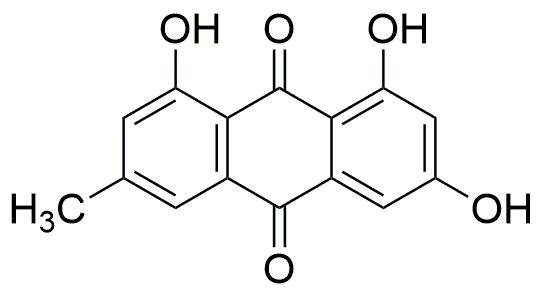Emodin is widely utilized in research focused on:
- Pharmaceutical Development: Emodin exhibits anti-inflammatory and anticancer properties, making it a valuable compound in the development of new medications targeting chronic diseases.
- Natural Remedies: Commonly found in traditional medicine, it is used in herbal formulations for its laxative effects and to treat various ailments, appealing to the growing market for natural health products.
- Food Industry: Emodin is explored for its potential as a natural food preservative due to its antimicrobial properties, providing a safer alternative to synthetic preservatives.
- Cosmetics: Its antioxidant properties are harnessed in skincare products, helping to protect skin from oxidative stress and improve overall skin health.
- Environmental Applications: Research is ongoing into its use in bioremediation processes, where it may help in the degradation of pollutants, thus contributing to environmental sustainability efforts.
General Information
Properties
Safety and Regulations
Applications
Emodin is widely utilized in research focused on:
- Pharmaceutical Development: Emodin exhibits anti-inflammatory and anticancer properties, making it a valuable compound in the development of new medications targeting chronic diseases.
- Natural Remedies: Commonly found in traditional medicine, it is used in herbal formulations for its laxative effects and to treat various ailments, appealing to the growing market for natural health products.
- Food Industry: Emodin is explored for its potential as a natural food preservative due to its antimicrobial properties, providing a safer alternative to synthetic preservatives.
- Cosmetics: Its antioxidant properties are harnessed in skincare products, helping to protect skin from oxidative stress and improve overall skin health.
- Environmental Applications: Research is ongoing into its use in bioremediation processes, where it may help in the degradation of pollutants, thus contributing to environmental sustainability efforts.
Documents
Safety Data Sheets (SDS)
The SDS provides comprehensive safety information on handling, storage, and disposal of the product.
Product Specification (PS)
The PS provides a comprehensive breakdown of the product’s properties, including chemical composition, physical state, purity, and storage requirements. It also details acceptable quality ranges and the product's intended applications.
Certificates of Analysis (COA)
Search for Certificates of Analysis (COA) by entering the products Lot Number. Lot and Batch Numbers can be found on a product’s label following the words ‘Lot’ or ‘Batch’.
*Catalog Number
*Lot Number
Certificates Of Origin (COO)
This COO confirms the country where the product was manufactured, and also details the materials and components used in it and whether it is derived from natural, synthetic, or other specific sources. This certificate may be required for customs, trade, and regulatory compliance.
*Catalog Number
*Lot Number
Safety Data Sheets (SDS)
The SDS provides comprehensive safety information on handling, storage, and disposal of the product.
DownloadProduct Specification (PS)
The PS provides a comprehensive breakdown of the product’s properties, including chemical composition, physical state, purity, and storage requirements. It also details acceptable quality ranges and the product's intended applications.
DownloadCertificates of Analysis (COA)
Search for Certificates of Analysis (COA) by entering the products Lot Number. Lot and Batch Numbers can be found on a product’s label following the words ‘Lot’ or ‘Batch’.
*Catalog Number
*Lot Number
Certificates Of Origin (COO)
This COO confirms the country where the product was manufactured, and also details the materials and components used in it and whether it is derived from natural, synthetic, or other specific sources. This certificate may be required for customs, trade, and regulatory compliance.


